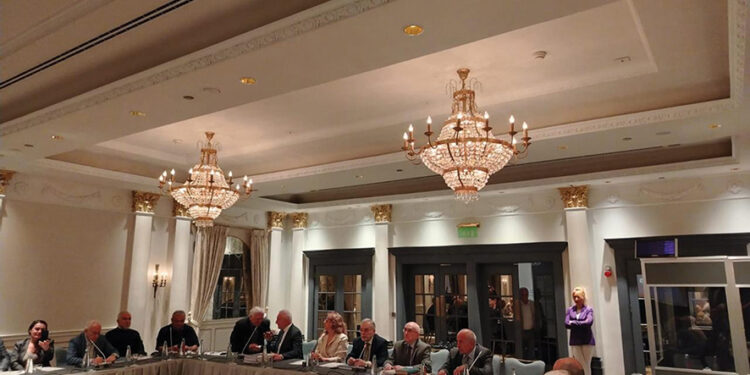Georgia is a rich country—these hopeful, invigorating words, confidently voiced by the keynote speaker, resonated through the conference hall of the Tbilisi Marriott Hotel on June 17. They rang out as one of the most uplifting declarations publicly heard in this land in decades. Indeed, merely leafing through the large-format hardcover edition presented that day—detailing the country’s mineral wealth and much more—one might easily be convinced that Sakartvelo is, in fact, abundantly endowed. The challenge lies in managing this wealth wisely and effectively.

The book presented on this notable occasion is co-authored by physicist and mathematician Givi Talakvadze and economist Ioseb Archvadze—both distinguished Georgian scientists and academicians of high standing. Talakvadze also heads the International Innovation Alliance, under whose aegis the book was published and the conference was organized. The event itself was meticulously planned and executed by Teimuraz Shashiashvili, member of the Gelati Academy and one of the founding members of the Georgian Congress of Scientists. The proceedings were expertly and gracefully moderated by Medea Abashidze, director of the ‘Kartuli’ Joint Stock Company. Academician Vladimir (Lado) Papava, Vice President of the Georgian National Academy of Sciences, opened the conference. Several other academicians and leading figures from Georgia’s managerial and scientific spheres also addressed the audience—each of them actively contributing to the nation’s scientific advancement, both in theory and in practice.

The book, the result of extensive and diligent work, offers a thorough overview of Georgia’s national wealth, including land, forests, water, minerals, energy resources, biodiversity, and recreational assets—as well as potential strategies for their effective use. The authors emphasize the vital connection between Georgia’s God-given natural abundance and the nation’s potential prosperity, a link that depends heavily on human responsibility and stewardship. They also subtly highlight an intriguing point: some of these natural resources are being acquired by foreign partners—not for immediate exploitation, but to be kept in passive preservation for future strategic purposes. This assertion is supported by findings from the Congress of Georgian Scientists. Whether this phenomenon should be viewed as positive or negative for Sakartvelo—blessed as it is by nature—we shall leave unjudged, as the authors themselves do, with tactful restraint.
Titled ‘Georgia’s Integral Resources,’ the book is based on data officially published by the National Statistics Office of Georgia. Far from being a dull or purely technical text, it is a compelling, multifaceted, and informative desk reference. As one of the event’s speakers aptly remarked, it deserves a place in every Georgian home and should be used as an academic aid to educate and inspire a deeper sense of national self-awareness. However, with a retail price of 100 GEL, it may not be accessible to all. Given its unique value, the book certainly warrants translation into English for presentation to the international community.
It is also worth highlighting the commendable support Georgian business has shown toward national scientific endeavors—endeavors that represent one of the country’s brightest hopes for future progress. Standing out among these supporters is Gocha Dzasokhov, a respected businessman, public figure, and longtime patron of science. Since the earliest efforts to elevate Georgian science to a position of national priority, Dzasokhov has been a key partner in close collaboration with Teimuraz Shashiashvili, whose vital role in this initiative is widely recognized.
Reflecting on Georgia’s international connections at the dawn of its renewed independence in the 1990s, I can’t help recalling how a group of Georgian enthusiasts—Professor Irakli Bokuchava and myself among them—believed that the country’s development had to begin with an honest self-assessment, a “snapshot” of our internal and external wealth. With this in mind, renowned American expert Lawrence De Bivort was invited to Georgia to meet then-President Zviad Gamsakhurdia and explore development prospects rooted in our natural endowments. The initiative was titled The Georgia Initiative. The meeting took place, plans were drawn up, and everything seemed poised for takeoff. But, alas, history took a different turn. The first Georgian president was ousted and forced into exile, with consequences all too well known to our people.

And now, after all these years, it is almost unbelievable—and deeply moving—to witness the realization of a dream once shared by hopeful patriots. It may have taken an entire generation, but that dream has finally come true. As the authors note in the introduction to this remarkable edition, the primary task of the state is to secure the well-being and sustainable development of the country and its people.
Now, here is a book that shows us the way. Let us read it, learn from it, and work together toward that meaningful goal. Let us make good use of it!
Blog by Nugzar B. Ruhadze














